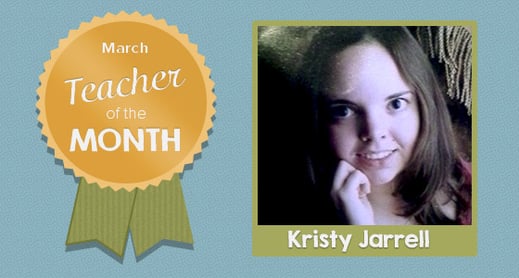
Kristy works as a pre-K teacher in Georgia and was willing to sit down with me and talk about what inspires her to teach and more. Her nominator shared that Kristy is a “ray of sunshine” and after one conversation with her, it's clear that Kristy loves what she does.
Tell me about yourself and how you got started in teaching.
I started college and didn’t know what I wanted to do. I had worked as a camp counselor for a a few years and loved working with the kids, especially the younger children, so I decided to study early childhood education. After school, I worked as an assistant teacher for two years and now I’m going on my third year as a lead teacher.
What do you like most about teaching?
There are a lot of underprivileged children at our center and a lot of people don’t think these kids will amount to much in life. I love giving them the support and tools to prove everyone wrong. They have as much potential as anybody to succeed.
At the end of the year, I love reflecting back on how much the kids have grown. I had one student who, when she started, wanted to bite people, throw things, wouldn’t sit on the rug, and was almost non-verbal. By the end of the year, she had formed some great relationships with her classmates and was always participating. She wanted to talk and share and be part of the day. That was incredibly rewarding.
What is the hardest part about teaching?
These children go through so much in their home life. They've seen things that I didn’t see until I was an adult, and they have had to grow up so quickly. They bring those experiences into the classroom and we, as teachers, have to support them and deal with whatever challenges each kid brings.
It’s so important to get to know the kids and the parents. Once you get to know them, it’s much easier to understand where they are coming from and to work together when challenges come up.
Learning is different for every child. Sometimes a child might act out or just sit and pout. You have to let these kids know that you care and that you still want them to try their best. That might mean working with a child one-on-one to make sure they get the supports (both emotional and academic) that they need.
How did you learn about the CLASS tool?
I learned about it when observers came to monitor my classroom. I didn’t know about the tool or what these observers were doing, so I asked them to tell me more. At the simplest level the tool is about forming relationships and getting to know your students. I liked that. Once you connect, the students want to make you proud and do their best for you. Most of my training on CLASS has been informal.
What dimension do you think you are strongest in?
Positive Climate. I’m always smiling and making sure my classroom is a comfortable place for the kids. I have also been working on improving Behavior Management.
What dimension do you struggle with?
The Instructional Support domain is a challenge for me. I try to ask a lot of how and why questions. I really want each child to be able to think for themselves.
How have you seen your classroom change since you learned about CLASS?
The children talk a lot more. I have several students in my classroom where English is their second language. I’ve seen that they are able to open up more. We had one little boy who spoke very little English. My teaching assistant and I worked on learning some Spanish phrases to make him feel welcome. We would say “Good morning,” “How are you?” and “See you tomorrow”—and one day he turned around and said “Goodbye!” In English! It was so cool to see that he felt comfortable with us and had been picking things up much more quickly than we thought he had been. That’s one of the best things about teaching—seeing how much the children are absorbing even if it doesn’t seem like it at first.
Do you have any advice for teachers in the field?
Stay positive. There are a lot of hard days especially with the types of children we work with. Don’t let them see you are frustrated and really work on building those relationships.

